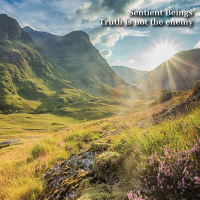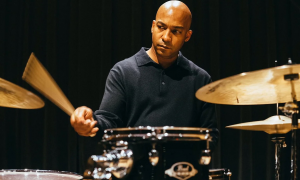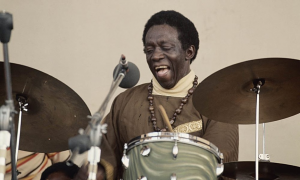Home » Jazz Articles » Interview » Ben Sidran: It Don't Mean A Thing If It Ain't Got That Swing State
Ben Sidran: It Don't Mean A Thing If It Ain't Got That Swing State

Courtesy Leo Sidran
When you’re educated, you don’t necessarily get smarter, you get skeptical. I think we have an education problem. I think we have a memory problem. And I think we have a fear problem.
—Ben Sidran
He still tours annually in Europe and recently completed a short run through the upper Midwest swing states of Wisconsin and Michigan with son Leo Sidran (drums), Billy Peterson (bass) and Bill McHenry (saxophone). Swing State was Sidran's first all-instrumental album, released on the Nardis label in 2022 as months of heated rhetoric preceded the November midterm elections, leading some to wonder if the adroit musician had been exasperated by the corrosive politics and finally ran out of things to say. Ed Krech, who used to sell me scads of records from his Wethersfield, Connecticut shop, Integrity 'n Music, once met Sidran and fondly called him a mensch. The Yiddish word came into use in English with the large influx of Eastern European Jews to the United States after WWI. It describes a person of honor, integrity and class, qualities Sidran exudes both personally and professionally.
I bought my first record of his at that store in 1974. The sketch of a gruff bulldog on the jacket of Don't Let Go (Blue Thumb, 1974) is what caught my attention. Also, Krech told me he was sure I would like it while pointing at the sign above the door that read "NO RETURNS!" It did not seem like the right moment to point out that customers leaving the shop might take that message the wrong way. The LP is still in my racks of vinyl LPs and was taken out for a spin shortly before this interview took place. That sturdy rhythm section of Phil Upchurch (bass) and Clyde Stubblefield (drums) came over as clearly as a refreshed memory on songs such as Bud Powell's "Monopoly," and though no one could top Frank Sinatra, Sidran's take on the ballad "She's Funny That Way."
His voice may not have the same timbre today as it did in 1974, but it sounded reasonably close earlier this year in France. Assisted by sublime guitarist Rodolphe Burger and a solid cast of musicians, he recorded Rainmaker (Bonsai Music, 2024), which contains some of the best songs of his long career. "Victim de la Mode" has its own personal history. "It's a dialogue between my original song, a hip-hop interpretation, and my response to the whole journey." And the clever contrivance of Burger ghosting Sidran's vocals in French on "Humanity" calls for an instant replay.
The focus of this interview, however, is not on something new, rather on the ten tracks he borrowed from his discography to assemble the compilation, Swing State (Ballads for Ballots). "Despite all my best efforts, I have noticed a particular political thread running through many of the songs from my most recent albums," Sidran noted. "So, I compiled a playlist—a collection of songs from the last handful of my releases that are particularly resonant in this election season."
A preponderance of Americans is regarding the elections in November 2024 as extremely consequential. Most polls agree that people care deeply now because of the ravages of inflation. The weekly trip to the supermarket is more dreaded than going to the dentist. Families are having to make hard choices, live with less if they want to put gas in the car or oil in the furnace. People are aware over 20 million immigrants have come into the country without being vetted with no end in sight. There are so many issues even the issues have issues: Billions poured into the war in Ukraine, the Middle East tinderbox conflict, 100,000 Americans a year dying from fentanyl poisoning, Iran threatening soon to become a nuclear power, two assassination attempts, climate change, abortion rights, human trafficking on a large scale, $33 trillion and counting as the national debt rises faster than a loaf of bread with triple the yeast. As Democratic Party strategist James Carville famously said when asked what issue drives an election, "It's the economy, stupid. It's always the economy."
Sidran has found it is not easy keeping quiet in times like these, but it is not easy speaking out either in a country that could hardly be more divided. If only society was like a musical score. A chord sequence can be resolved in any number of ways, but an election is only resolved by one of two choices and those choices carry consequences for the future of the country.
Wearing your politics on your sleeve may not be a great fashion accessory.
All About Jazz: Great to see you, sir, especially since for once I'm not the oldest guy on the Zoom call.Ben Sidran: It's happening all the time for me these days. You're very welcome.
AAJ: I've read that you've been called "the existential jazz rapper." How does that term strike you? Have you tried it on for size?
BS: I tend to be more philosophical than narrative. I like to talk ideas and I've found a way to do that while playing certain rhythm patterns. Maybe that's the reason. Everybody has to find their niche, and that is my thing.
AAJ: Some of the short videos you've posted on Facebook are pretty clever. For example, in one you say "I take requests but I never play them." It's like the Seinfeld episode with the rental car attendant. Jerry says, "You know how to take the reservation, but you just don't know how to hold the reservation."
BS: The lady said, "Sir, we know how to hold reservations," and Jerry replies, "No, I don't think you do. If you did, I'd have a car."
AAJ: Let's talk about your album We The People (Ballads for Ballots). You have said in an effort to remain politically neutral, you found yourself writing some songs that may not be overtly political but do have that sort of message.
BS: When I say I tried to avoid being political, what I meant was I've always worn my politics on my sleeve. I never was as interested in getting into the political discussion as I was getting into the philosophical discussion. It's just my nature. I thought there were other things I could contribute to the conversation, usually specific people and specific issues.
AAJ:These days wearing your politics on your sleeve is probably not the best way to get dressed.
BS: Exactly. It's just so incomprehensible to me, and I think many people, what we've been going through the past several years. I couldn't have imagined what has happened here in America. It moved the dial for me, and I think I had to find a way to reach out maybe a little further.
AAJ: What is troubling is that people have become dismissive of those that are on the other "team," so to speak, as if politics has become a team sport with fierce rivalries.
BS: When you peel back the layers, anger is driven by fear and fear is something politicians use to control people's actions. So, when you see people lined up on either side of the room, a lot of that is manipulated by the news media. But the other thing is, over the last ten years the idea of historic memory has been dissolved by technology. If you told me aliens were landing in Chicago tomorrow, there's a part of me that wonders are they really landing. The skepticism that I have is a product of my education. When you're educated, you don't necessarily get smarter, you get skeptical. I think we have an education problem. I think we have a memory problem. And I think we have a fear problem.
AAJ: Let's go through the songs on the album. "Brand New Music" has a casual, bluesy feel. What could possibly go wrong? But something does go wrong?
BS: That's the takeaway. It starts out very casual, you know, how's that new car working out for you? Okay, somebody bought a new car, which is nice, but he bought it in this wild color that's getting a lot of attention. On the one hand, he thought it was a great idea, but on the other hand it's attracting attention from people he may not want to attract. It's about unintended consequences. Maybe think before you act.
AAJ: How many times in life have any of us wanted to say, "Wake Me When It's Over?" Wake me when it's over / Tell me when it's done / When they finally voted / You can let me know who won. If you live East of the Mississippi, there's no way you could stay up to watch the end of the elections and still be able to function the next day. But that's not what's going on here, is it?
BS: "Wake Me When It's Over" is about being inundated by false prophets, being inundated by the rhetoric of 24/7 news cycles. It's obviously an expression that says I'd rather sleep than know what's going on.
AAJ: If you watched the events on the street during the Democratic National Convention, you saw thousands of protestors in support of the Palestinian people, even including the terrorist organization Hamas, which rules Palestine. The Democratic Party has traditionally counted on 85-90% of the Jewish vote. Now, that number has sharply decreased, in part perhaps to the ambivalence of the current administration regarding the Arab-Israeli conflict.
BS: There has been evidence that people on the ground don't want a resolution. Any resolution is as distasteful as the wrong resolution. It's terrible that people are so invested in the lack of resolution.
AAJ: Three of the songs came from the Picture Him Happy (Nardis, 2017) album. One is "Another Old Bull," which I'm guessing was written about Donald Trump, but it could also apply to other old bulls from the past and present like Harry Reed, Mitch McConnell, Nancy Pelosi, Newt Gingrich and Chuck Schumer.
BS: It's obviously about Trump. I've tried to answer why he has so much support, answer it for myself. It's hard not to think of what happened in Germany eighty years ago. At the time, people were inspired by this angry rhetoric. The idea of eugenics was popular, so they cast the Jews as polluting the blood of the Germans. Today it seems like a crazy concept, but back then it was science. But we have this thing going on about race. I've always believed that if you look at the science, the genome, race doesn't exist. It's just local color. At the molecular level, people are the same. So, when you pit one group against another, whether you frame it as immigration or you frame it as racism, it's done to divide people. That's usually an indication to me, as my friend Mose Allison once said, that "everything comes down to this: It's somebody's life versus somebody else's money."
AAJ: People are worried about paying their bills, putting food on the table. It's no surprise the polls show the economy is the big dog issue.
BS: I guess you could say Americans are addicted to convenience. You know, there might not be anything to watch on television, but we're going to have one of those things in every room in our house. The convenience of money bringing convenience is also the convenience of not having to look too deeply into how we live and what our relationship is to other people. The other thing money does is build walls between people. A normal person sitting in a room across from another person with one hundred billion dollars, you're on two different planets. Money divides people. So, the people who are on the side of piling up as much money as possible have both physical and spiritual reasons for, let's say, keeping the population at bay. And that's really what all these ideas are for, to make it appear that it's them and us and, of course, I'm on your side. I'm going to help you. It's so cynical that you can't imagine people don't see through it.
AAJ: You can look at it as each political and social side hold different views on what are the most important issues challenging the country. On the Right, the big three are inflation, the border/immigration and the economy. On the Left, the concern is for abortion rights, climate change and saving democracy. The two sides are miles apart and can't even agree on where to start in solving the country's problems, so where does the dialogue begin?
BS: Well, there's the idea of alternative facts to consider. If you look at statistics, inflation is down, border crossings are way down. If you look at statistics, the economy is doing well; more jobs are being created. Then there should be no reason to believe in the Trumpian panic. But this is the more cynical part of the MAGA crowd, if you call into question the truth of statistics, the game's up. The other party is just paddling along saying, hey, we have problems, let's solve them. But if the MAGA crowd won't agree to help fix the problems, where are you?
AAJ: Mark Twain had this famous line about using the persuasive power of statistics to bolster weak arguments. "There are three kinds of lies: Lies, damned lies and statistics." As an example, the last jobs report for fiscal year 2023 showed 2.5 million new jobs were created. Sounds good. Then an independent audit proved that the report was "off" by 1 million jobs. That's a 40% accounting error. On top of that, the bulk of the remaining jobs, over 80%, were either returning jobs lost during the pandemic or new hires in the federal government bureaucracy. Border crossings are not down according to fact-checking DHS statistics. And inflation—well, Biden claimed it was at 9% when he took office. He flat out, er ... mis-spoke, I believe, is the accepted word.
BS: I hadn't heard anything like that, but there must be some other factors involved.
AAJ: There could be other factors, but let's get back to the music. "I Might Be Wrong" carries the weight of grief or loss. You should have been here before the fall / Now it's the price of everything and the value of nothing at all.
BS: Well, that's what we're talking about. How much does that thing cost, not what's it worth. If you assume that things are better because they're expensive, you strive to buy the most expensive things. You are on the path of trying to amass money rather than spending time with your friends and family. Essentially, if you question all science, which scientists do, there's nothing wrong with that. But evidence has some validity, and science says that happiness and long life come from your social connections. Realizing that you are part of a larger group, and that we are more alike than different.
When I talk about the price of everything and the value of nothing, or, the past ain't what it was and the future ain't what it used to be, that's about memory. We used to remember the past according to certain ideas, discussions and goals. Let's say social justice is the goal. What is that? It's the Golden Rule: Treat others the way you wish to be treated. That used to be the ultimate brick in the foundation of American democracy. That's what we were taught. Basically, memory is all we can rely on in our march toward progress, freedom and social justice, which at one time everybody agreed was a worthy goal. Now, I don't think people can agree that's a worthy goal.
So, that song is about waking up one day, and everything you believed to be true, well, people don't believe it anymore. Like I say in the song: We are all just the sons of the Dharma Bums. We're all out here just trying to live a legitimate life. Wading in the water of the infinite flow. We are just washed by time. Think of it as a portrait, a watercolor of the human condition today where everything that was solid is now kind of washed out. I may be wrong, but I think that song is really about the dissolution of history.
AAJ: "Big Brother" has the obvious Orwellian reference: I only tell you 'cause it's true / Big brother is watching you. I love the crispy guitar fills by Will Bernard in this one. You might think he is Grant Green's lost son. Do you feel the government is sticking its nose a little too far into the affairs of the people?
BS: I don't know if this has ever happened to you, but have you ever written an email where you mention a particular service or product and within five minutes here comes an advertisement in your browser for that very same product? Somebody has to be watching something. Safari is supposed to be good at stopping such things. But they keep coming.
AAJ: I don't know about Apple products because I'm using a PC, but I did uninstall and delete anything to do with Google on my laptop. I started using DuckDuckGo for a browser, and that one has a great reputation for blocking popups and PPC (pay-per-click) ads. Sometimes, I would make a call on my cell phone, mention some product like you say, and an ad would show up in Google Chrome. That's when I deleted everything Google.
BS: What's up with that? I recently got a call on my cell phone, a pitch for something or other. I asked how they got my cell number since I don't put it out there. The guy said, oh, yeah, it's right here in my database. Well, I didn't authorize that. Talk about Big Brother. Now it's algo-rhythmic as opposed to Orwellian.
AAJ: "Old Wine in a New Bottle" is a phrase that Jesus used in Matthew's Gospel. He was talking about not wanting people to live like the Pharisees. Back then, wine was kept in animal skins, and He wanted the wine to be put into new bottles. But in your song, where is that going?
BS: The more things change; the more they stay the same. You know the Bible told us / Nothin' new beneath the sun / Before you even do it / it's already done. It's as simple as that.
AAJ: On "Too Many People" ..... (Sidran jumps in ...)
BS: Got nothing to say but they're talking louder and louder anyway. It's the level of anger-driven discourse. This has been going on for some time. It goes back to the Tea Party, and it's too bad. If you trace the history of the Republican Party, it has a noble history. But in the '80s, it became something else, and today it's simply about denying the Democrat Party the ability to do anything. The Republicans aren't about anything but allowing Trump to vilify people that are not his supporters. A lot of Republicans strike me that way as people looking to con you, trying to sell you something you don't really need like snake oil salesmen. I'm not saying the Democrats are pure, but it's pretty obvious why there has been a lack of any substantive discussion.
AAJ: Can we be sure that either party really has the best interests of Americans at heart anymore? You see it in inflation. The primary cause of inflation is excessive spending. The country is now some $33 trillion in debt for which the interest tab is $1 trillion annually. Yet, whenever there's a social problem or a war to get into, the answer is to throw money at it, most of which seems likelier to wind up in some special interest group's pocket before it reaches its destination. I guess a cynic would say someone's pocket is the actual destination.
BS: That's exactly right. Follow the money has never been truer. In whose interest is it to support one policy over another? It does not appear to be in the public's interest.
AAJ: You've spent a lot of time and years touring in Europe. What's your opinion of the social and political systems in those countries?
BS: In Denmark, for example, they don't have five TV's in every house, but they are healthier, their education is provided for and they're not spending a fortune on ammunition. Norway, Sweden, the same. France, heaven help them, where you can retire at 50, it's a doomed overly optimistic cycle, but the intent is quality of life not wealth. That's a critical difference. I mean, I have acquaintances worth $100 million, and they panic that they won't have enough money. I said to one of these friends with a great deal of money but was concerned, do you have enough money to last for six months? Of course he did. Well, how do you know you're gonna last for six months? What are we really talking about? Replace six months with six years. Do you still have enough? Yes, he had enough. Will you last six years? What are we really talking about then?
AAJ: "Someday Baby" is off the Rainmaker album. In the worst way, I want to say I ain't gonna worry my life anymore, but this isn't Sleepy John Estes' classic blues. Actually, it reminded me more of the old hit by The Supremes, "Someday We'll Be Together."
BS: I never thought of that song, but it's definitely true. You have a point. I felt obligated to write something positive. The first image is of Someday we'll all be free / We're going to open up the windows / open up the doors / and that day we're not gonna have to hide no more. I get the feeling that people are hiding, everywhere, hiding behind closed windows and closed doors. COVID is the obvious reference, but even more so is the vicious attacks on gays, antisemitism, anti-Muslim, anti-anti-anti-everything. People are hiding, not sharing opinions or views, not giving each other room to be who they are. The hope is someday people will stop having to hide.
AAJ: The front cover artwork depicts two Statues of Liberty. What does this represent?
BS: I could talk forever about the Statue of Liberty for a lot of reasons. It represents this gift from France to the United States. It's about economics and trade. But in 1880, a little Jewish girl named Emma Lazarus wrote a poem: Give me your tired, your poor, your huddled masses yearning to breathe free, The wretched refuse of your teeming shore. Send these, the homeless, tempest-tossed to me, I lift my lamp beside the golden door. It was the framework for social justice in America. The idea came from two million Jewish refugees from the Pale of Settlement, who had been hunted down by the Russians. Of course, there's irony involved because during World War II, several large boats filled with Jews fleeing the Holocaust were turned away from the United States. They were turned away from Great Britain. Turned away from so-called civilized countries.
AAJ: I saw this post on your Facebook page comparing a human brain to a dog's brain. In humans, 98% are questions and 2% is looking out the window aimlessly. Just want to be sure of the distinction.
BS: See, I'm not afraid to learn from anywhere. If you've got something for me, I want to know about it. One day, I'm driving down the street with my dog in the car. He's happy, having a good time with his face out the window. We come to a stop sign, and both of us turn to look at each other. It comes to me that he doesn't know I'm driving the car. He doesn't know the concept of driving, that a car needs to be driven. All he knows is that from time to time, he can get in the car and have the wind blow in his face and that's cool. Just as he doesn't understand that a car has to be driven, there are so many things I don't understand. We can only understand what we've been designed to understand. I get humility from my dog. I get humility from the thousands of living things out there that are just trying to make the best of their time on the planet. It goes back to political discussion. Politics is a uniquely human thing. There's not a lot of politics among dogs. The basic thing we're all trying to do here, aside from figuring out what it all means, which no one will ever do, is to get through this adventure with some sense of right behavior, a sense of connection. I learned that from my dog, and his brain is 100% looking out the window.
AAJ: That reminds me of one of Bruce Hornsby's songs: Look out any window / See what's going on in the world around you. He's expressing frustration with the big boys telling you everything they're gonna do. The piano solo involves an up-tempo, 9-chord modulation back down to, far away, too many leaders let 'em get their way.
BS: One of the big advantages of being a musician is you get to see the world. I have spent a lot of time, intentionally, in Europe, starting in the '70s. The Europeans have a love for history and culture. I like being around that.
AAJ: Are you pleased that you put together this compilation?
BS: Yes. The compilation is essentially raising a dissenter's hand in the middle of a conversation. That's what it felt like to me. Just a brief interruption in the ongoing dialogue. Hold on. It's not trying to make points that will sway anybody's position; it's only there to put a slight retard in our rolling toward oblivion. It's creating some consciousness.
Tags
Interview
ben sidran
dean nardi
Phil Upchurch
Clyde Stubblefield
Bud Powell
Rainmaker
Leo Sidran
frank sinatra
We The People Ballads for Ballots
Emma Lazarus
Bruce Hornsby
Grant Green
Will Bernard
Comments
About Ben Sidran
Instrument: Piano and vocals
Related Articles | Concerts | Albums | Photos | Similar ToPREVIOUS / NEXT
Support All About Jazz
 All About Jazz has been a pillar of jazz since 1995, championing it as an art form and, more importantly, supporting the musicians who make it. Our enduring commitment has made "AAJ" one of the most culturally important websites of its kind, read by hundreds of thousands of fans, musicians and industry figures every month.
All About Jazz has been a pillar of jazz since 1995, championing it as an art form and, more importantly, supporting the musicians who make it. Our enduring commitment has made "AAJ" one of the most culturally important websites of its kind, read by hundreds of thousands of fans, musicians and industry figures every month.






























